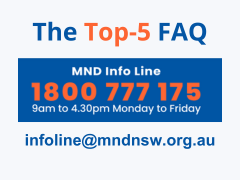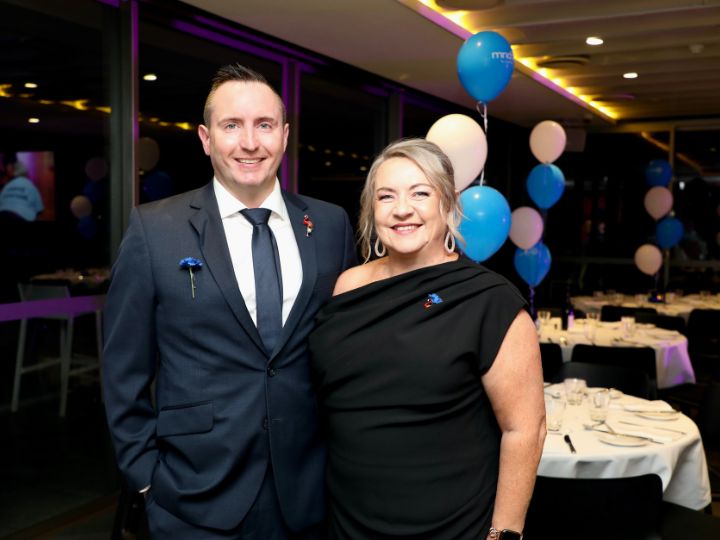Motor Neurone Disease (MND), also known as Amyotrophic Lateral Sclerosis (ALS), is an uncommon but devastating disease that affects the nerves (neurons) controlling muscles.Over time, these neurons degenerate and die, leading to progressive muscle weakness.
On average, two Australians are diagnosed with the condition each day, and sadly MND currently has no cure. In 5-10% of cases, MND runs in families and several genes have been linked to causing MND. In the remaining 90-95% of cases, MND is sporadic with no apparent genetic link. However, genetic and environmental factors are also likely to be involved. MND is most commonly diagnosed in older men, with a ratio of 1.5:1 men to women.
This nerve degeneration affects a person with MND’s breathing, walking, speech and movement, when the muscles controlling this slowly waste away.
Whilst early detection of MND is vital to help improve treatment options and maintain quality of life, unfortunately many of the early signs of MND are common with other muscle diseases and neurological disorders.
Neurologists and other health professionals diagnosing MND often need to rule out other conditions before making a formal MND diagnosis, a process that in some instances can take years from the onset of first symptoms. This sadly means people facing the condition live for 27 months on average after receiving their diagnosis.
Common Early Signs of Motor Neurone Disease
Some common early signs of MND include:
- Muscle weakness and fatigue – Approximately 70% of people with MND experience limb onset symptoms, characterised by difficulty with manual dexterity and awkwardness when walking or running. Muscle weakness from MND can cause stumbling, trouble holding or gripping objects, and the inability to complete tasks or activities that were previously enjoyed, such as work, sports, gardening, or other leisure activities. Foot drop, where one or both feet feel weak or drag when walking, and the front part of the foot cannot be lifted, is also a common early MND symptom for many people.
Fatigue is a common sign of MND, though often it is not the only symptom and occurs in conjunction with others such as muscle weakness or changes to breathing. Immobility, poor sleep and sleep disruption, repeated muscle twitching and cramping, and overexertion can contribute to the fatigue and tiredness commonly experienced by people in the earlier stages of MND.
- Muscle twitching and cramps – muscle twitching, also known as muscle fasciculations, are often experienced by people living with MND. These are spontaneous contractions of the muscles, and can feel like ripples under the skin.
Cramping can be an early, and annoying, sign of MND. Whilst cramping can occur at any time, it can commonly be experienced at night, causing sleep disruptions and contributing to the fatigue and tiredness experienced by people living with MND.
- Difficulty with fine motor skills – Muscle wasting, weakness and loss of co-ordination can occur early in MND, leading to difficulties with fine motor skills – people may experience trouble writing or drawing, picking up small objects, or performing everyday care tasks such as feeding themselves, buttoning clothing, haircare and shaving, or applying makeup.
- Changes in speech and swallowing – MND can affect the function of the muscles in the tongue and throat, meaning a person with the earlier stages of MND may notice changes in their ability to speak and swallow. As the disease progresses, they may notice their voice becomes hoarse or weak, particularly after trying to speak for longer periods of time. They may develop difficulty swallowing (dysphagia), which can lead to choking on foods and beverages they previously tolerated.
- Unexplained weight loss –As messages to the muscles are disrupted, causing the muscles weaken and waste away, a person living with MND may notice unexplained weight loss. This weight loss can be an early sign of MND, occurring due to the loss of muscle mass they are experiencing as part of the disease process. Also, around 40% of people with MND may experience hypermetabolism, which can contribute to weight loss.
- Changes in reflexes and coordination – Damaged motor neurons mean messages from the brain or spinal cord telling muscles to move are either delayed or can no longer get through. As such, people in the early stages of MND can experience slowed reaction times and may have difficulty with co-ordination. This can cause falls, clumsiness, and difficulties performing everyday care tasks or participating in work or leisure activities such as sports. Changes to reflexes may also be noticed by care professionals, where reflexes are overactive, delayed or even absent.
Some Less Common Early Signs of Motor Neurone Disease
While muscle weakness and loss of co-ordination are some of the more common early signs of MND, people may also experience changes to their breathing, emotions, and behaviour.
Whilst not as common in the initial stages of the disease, muscle stiffness can also be present for people living with early MND.
- Cognitive and behavioural changes – Over 50% of people living with MND will experience cognitive changes over the course of the disease. For around 5-15%, the changes to cognition are more severe, potentially leading to a diagnosis of Motor Neurone Disease with Frontotemporal Dementia, also known as MND/FTD. Often the symptoms of dementia precede the motor symptoms, sometimes by a number of years.
Changes to cognition and behaviour in MND can appear as irritability, difficulty recalling information or planning ahead, impusivity, apathy, difficulties with learning and concentration, trouble with emotions and maintaining socially appropriate behaviour.
- Breathing difficulties – Breathing difficulties are typically occur in the later stages of MND. However, for a smaller proportion of people experiencing the disease, it was one of their first symptoms. As muscles controlling the lungs weaken, people with MND may experience shortness of breath and breathlessness, quieter voice, difficulty coughing or sneezing, hypoxia and hypoventilation. Headaches and tiredness can also be an early feature of breathing difficulties in MND.
- Emotional changes and mood swings – People with MND may experience mood and emotional changes, due to the nature of dealing with significant changes to your life as a result of receiving an MND diagnosis, but also due to emotional lability (pseudo-bulbar effect). Emotional lability can cause emotions that don’t match how you really feel or appropriate for the situation, such as crying uncontrollably or laughing upon receiving upsetting news.
- Muscle stiffness and spasticity – Muscle stiffness and spasticity be experienced by some people, more commonly for people who are diagnosed with a form of MND called Primary Lateral Sclerosis (PLS). Muscle spasticity can limit movement and cause muscle and joint stiffness, particularly in the arms and legs.
Seeking Medical Attention
It is important to consult your regular health professionals, such as your GP, as soon as you notice any unusual symptoms that are impacting you. Whilst in most cases an MND diagnosis is unlikely, it is a serious condition, and can take some time to diagnose. The progression of the disease can also vary greatly between people, even those diagnosed with the same form of the disease. As such, it’s important to be proactive about your health.. If you have painless progressive muscle weakness or experiencing speaking and swallowing difficulty, see your doctor early. Early diagnosis can help identify the cause and ensure you receive the most appropriate treatment plan, whether it’s MND or something else.
Diagnosis and Next Steps
Your first step after noticing symptoms is to contact your regular health provider, such as your GP. They may ask you to undertake tests to assist in a diagnosis, or to form the basis for a referral to a specialist, such as a neurologist or geriatrician. Depending on the symptoms you have presented with, these tests could include blood tests, behavioural surveys and assessments, gait observation, scans such as ultrasound, Xray, CT or MRI, reflex observations, or nerve conduction studies. Your test results and symptoms, if suggestive of MND, may then be assessed according to diagnostic standards such as the Gold Coast criteria for the diagnosis of amyotrophic lateral sclerosis.
Upon receiving a diagnosis, you may feel a range of emotions, and wonder how the condition will impact your life, and the lives of your family and friends. MND NSW is here to provide support, equipment and information for people living with MND, their carers and families, in NSW, the ACT and NT. You can register as one of our participants by completing an intake form, and your local advisor will be in touch to answer any questions you have and to assist you along your MND journey. We also have educations and info sessions and information sessions and support groups available, and our FlexEquip team has equipment available for you to loan for free or as part of your NDIS plan upon referral from your healthcare professionals.
For any queries you may have about MND, at any stage of your MND journey, our MND Info Line can be contacted on 1800 777 175.




